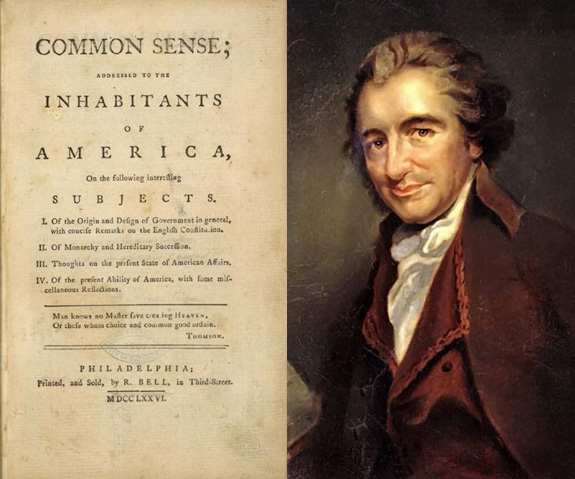January 9
Published upon this day in the year 1775 was the first great best-selling book on the American continent. Written by Thomas Paine, staymaker, pedagogue, customs officer, journalist, and toper, Common Sense was an instantaneous success, being hawked in almost every corner of the English Colonies within days of publication. It has been estimated that the tract had the most substantial sale of any single book in American history, taking into consideration the population of the Colonies in the 18th century. Within three months some 400,000 copies had been distributed to an audience of 3,000,000 colonists, many of whom could not even read. A comparative sale today would be over 24,000,000 copies.
Tom Paine arrived in Philadelphia in 1774 bearing a letter of introduction from Benjamin Franklin, addressed to his son-in-law, Richard Bache.
‘The bearer, Mr. Thomas Paine, is very well recommended tome, as an ingenious, worthy young man. He goes to Pennsylvania with a view of settling there. I request you to give him your best advice and countenance, as he is quite a stranger there.”
As an avocation Paine had long been interested in scientific ventures. It was through this association that he had won some influential friends, among whom was Franklin. Upon his arrival in Philadelphia he became a tutor and quickly entered the intellectual life of the city. One of his first friends was a printer, Robert Aitken, who was sufficiently impressed with Paine’s attainments that he made Paine the editor of The Pennsylvania Magazine, presenting Paine with his first opportunity to reach an American audience.
It is through Aitken that we learn of Paine’s methods of writing. Many years later Isaiah Thomas, the first historian of American printing, mentioned a letter which he had received from Aitken: “On one of the occasions, when Paine had neglected to supply the materials for the Magazine, within a short time of the day of publication, Aitken went to his lodgings and complained of Paine’s neglecting to fill his contract. Paine heard him patiently, and answered, ‘You shall have them in time.’ Aitken expressed some doubts on the subject, and insisted upon Paine’s accompanying him and proceeding immediately to business, as the workmen were waiting for copy. He accordingly went home with Aitken, and was soon seated at the table with the necessary apparatus, which always included a glass and a decanter of Brandy. Aitken observed, ‘he would never write without that.’ The first glass put him in a train of thinking; Aitken feared the second would disqualify him, or render him untractable; but it only illuminated his intellectual system; and when he had swallowed the third glass, he wrote with great rapidity, intelligence and precision; and his ideas appeared to flow faster than he could commit them to paper. What he penned from the inspiration of the brandy, was perfectly fit for the press without any alteration, or correction.”
